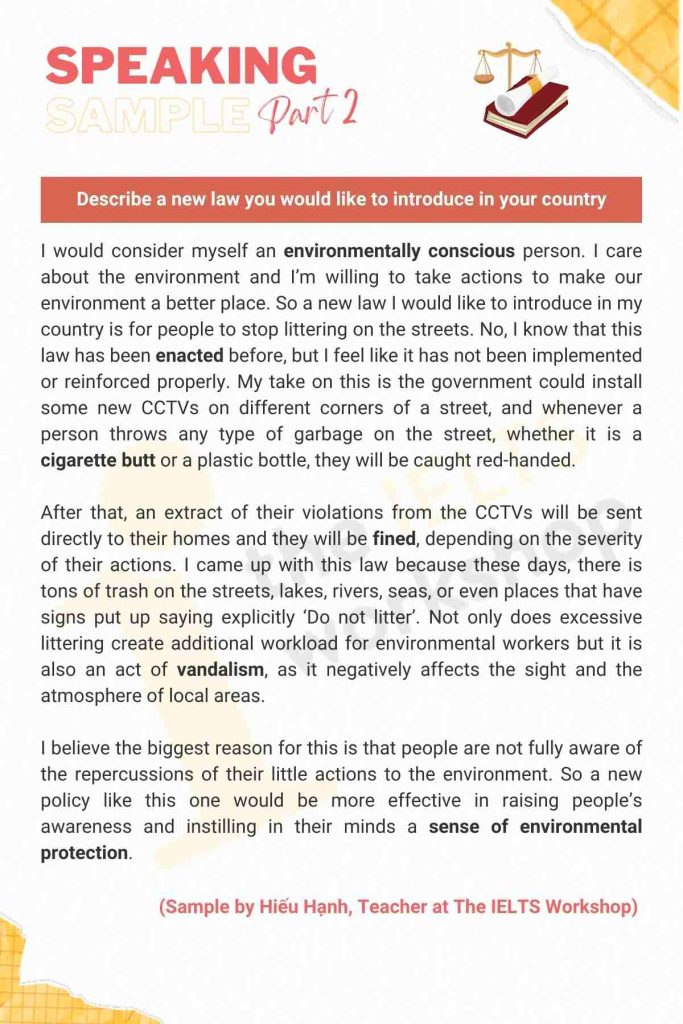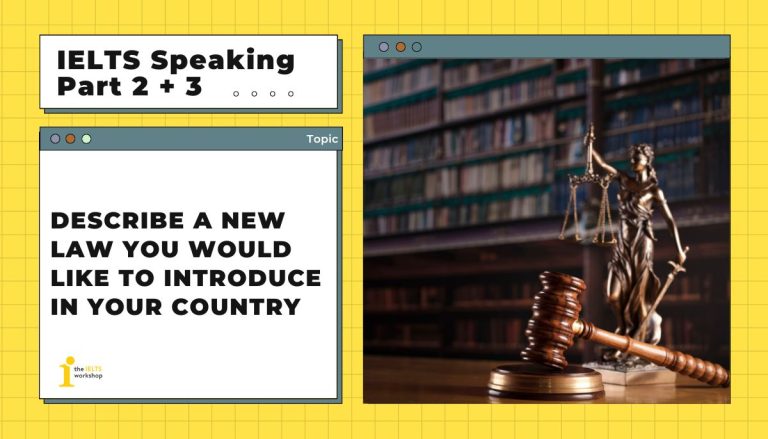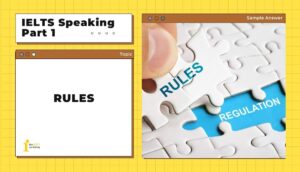Trong bài giải mẫu lần này, cô Hiếu Hạnh của The IELTS Workshop sẽ hướng dẫn bạn trả lời topic “Describe a new law you would like to introduce in your country“ trong IELTS Speaking Part 2. Cùng tham khảo sample, từ vựng và một vài cách diễn đạt ghi điểm trong phần thi IELTS Speaking nhé.
Part 2: Describe a new law you would like to introduce in your country
Describe a new law you would like to introduce in your country
You should say:
What law it is
What changes this law brings
Whether this new law will be popular
How you came up with the new law
And explain how you feel about this new law
Dưới đây là bài mẫu cho topic “Describe a new law you would like to introduce in your country“.
1. Bài mẫu (Sample)

2. Từ vựng (Vocabulary)
- Environmentally conscious: quan tâm đến môi trường
- Enact a law: ban hành luật
- Cigarette butt: tàn thuốc lá
- Fine: phạt tiền
- Vandalism: hành động phá hoại của công
- A sense of environmental protection: ý thức bảo vệ môi trường
Part 3:
Bên cạnh Part 2, bạn hãy tham khảo thêm Part 3 cho chủ đề này nhé
What rules should students follow at school?
Do people in your country usually obey the law?
What kinds of behavior are considered as good behavior?
Do you think children can learn about the law outside of school?
What are the benefits for people to obey rules?
How can parents teach children to obey rules?
1. What rules should students follow at school?
There are certain regulations that students should stick to when they’re in school. First of all, students should be banned from using mobile phones during class. This hinders them from participating in the lesson and eventually, undermines their academic performance. Second of all, students must wear uniform to school. Not only does this ease the workload of school managers in keeping track of their students, it also creates a sense of togetherness and helps bridge the gap between the rich and the poor.
- Regulations: luật lệ
- A sense of togetherness: tinh thần đoàn kết
2. Do people in your country usually obey the law?
I wouldn’t say so. Especially when it comes to traffic laws. People usually run the red light when there is no policeman around, and sometimes they don’t wear helmets when they travel using motorbikes. However, from my observation, when they are at work, people generally stick to the laws. I think it’s because it’s got to do with their income.
- Follow/obey/stick to the rules: tuân theo luật lệ
- Run the red light: vượt đèn đỏ
3. What kinds of behavior are considered as good behavior?
It depends on the setting, whether it’s a social setting, work setting or school setting. But in general, I think that good behavior can be deemed as behavior that is morally right, something that benefits the society or a large group of people as a whole, and helps to shape a person into a well-rounded being. For example, if a child has good behavior, it means they are obedient, hard-working and treat others with kindness.
4. Do you think children can learn about the law outside of school?
Of course. It is beneficial for kids to be informed about laws outside their academic setting because they can do wonders for their self-development. However, I do believe we should be selective when it comes to introducing laws to kids. For example, a toddler might not need to know about the rules and regulations of an international workplace, but they might need to know about traffic laws to protect themselves and others around them.
5. What are the benefits for people to obey rules?
I believe there are numerous advantages. First of all, it is beneficial for individuals. When one obeys rules, he is required to follow a certain routine and this nurtures discipline, which is the main contributor to success. Another positive aspect of following the rules to a tee facilitates a sense of uniformity and unity. If everyone is insistent on doing things their own way, it would be absolute chaos.
- Follow the rules to a tee: tuân theo y như được bảo
- Uniformity: sự đồng bộ
6. How can parents teach children to obey rules?
Certain methods can be implemented. There’s the old way, whenever a child does something wrong, they would receive corporal punishment. However, this is not always a good idea as it might foster a sense of fear and insecurity in the child, which might lead to severe mental health issues such as social anxiety or depression. I believe this should only be the last resort. A parent could remind the kid about the rule and inform them of the negative impacts of their actions if they do something wrong. If in the future, the kid does not repeat the mistake, parents can give them positive reinforcements for sticking to the rules.
- Corporal punishment: trừng phạt thân thể
Bài mẫu bởi cô Hiếu Hạnh – Giáo viên The IELTS Workshop
Các bạn có thể tham khảo các bài mẫu IELTS Speaking Part 2 của The IELTS Workshop cũng như tham gia bài test trình độ tiếng Anh và nhận tư vấn lộ trình miễn phí tại đây!
Nếu bạn muốn nhận Mentor 1-1 để hoàn thiện kĩ năng Speaking của mình trước khi bước vào kỳ thi, tham khảo ngay Khóa bổ trợ từng kỹ năng IELTS của The IELTS Workshop.









